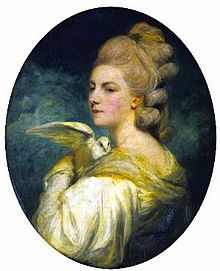Mary Nesbitt
| Mary Nesbitt | |
|---|---|

Painting of Mary Nesbitt by the artist Joshua Reynolds, 1781, Wallace Collection, London
|
|
| Born |
Mary Davis 1742 Covent Garden |
| Died | 1825 Paris |
| Nationality | English |
| Occupation | Socialite and courtesan |
| Known for | Mixed in the elevated circles of government and royalty in late 18th century Great Britain |
Mary Nesbitt (born 1742/3 - died 1825) was an English upper class socialite and courtesan who mixed in the elevated circles of government and royalty in late 18th century Great Britain. Her home, Norwood House, in Upper Norwood, then Surrey, now South London, became a meeting place for the rich and powerful.
She was born Mary Davis, in poverty and of unknown parentage. Her enemies later alleged that she had been born ‘in a wheelbarrow’ in Covent Garden. She was also early on known as Polly Davis.
Her society career began as an artist's model for Sir Joshua Reynolds in 1764. Through this connection she began her career as a courtesan. Simon Luttrell, nicknamed the King of Hell and later first earl of Carhampton, was possibly her original seducer. Her association with Luttrell may be the origin of her later nickname of Hellfire Davies.
Through Luttrell she was introduced to Alexander Nesbitt (bap 1730 - d 1772), the youngest of three sons of Thomas Nesbitt, a merchant banker in the City of London.
Mary married Nesbitt, on 25 February 1768, at St Martin-in-the-Fields, with Luttrell as a witness. Nesbitt settled on her for life his house and estate at Upper Norwood in Surrey. The couple also had a residence at 10 Buckingham Street, London.
Alexander Nesbitt suffered a mental collapse and was confined in private lodgings near Blackfriars around 1769, he died in 1772. Mary's enemies, the news sheet Tête-à-tête and the anonymous Junius, attributed his insanity to her disrespectful treatment of him.
Around 1771 Mary became the mistress of the Hon. Augustus John Hervey (1724–1779), a naval officer, and second son of Lord Hervey of Ickworth (1696–1743). Hervey became third earl of Bristol in 1775, and Mary and Augustus lived together, apparently faithfully, at Norwood House. They also had residences at 6 St James's Square, London and at Ickworth House, Suffolk. They were prevented from marrying when the earl's divorce petition was dismissed in 1779.
...
Wikipedia
